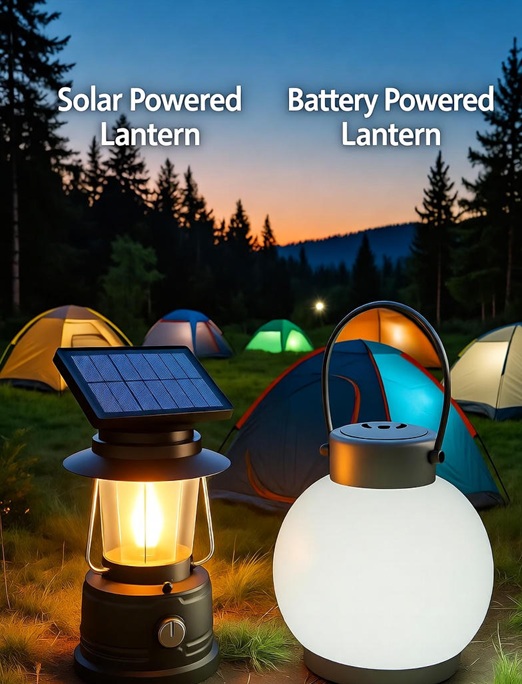This blog post may contain affiliate links. As an Amazon Associate I earn from qualifying purchases.
When you’re planning a camping trip, lighting is one of the most important things to consider. You want something reliable, easy to use, and that won’t let you down when it gets dark.
But should you choose a solar-powered lantern or a battery-powered one? Both have their strengths, but which one fits your needs best? You’ll discover the key differences that can make your camping experience safer and more enjoyable. Keep reading to find out which lantern will light up your next adventure perfectly.
Also Read: Planning Your Campsite Living Area: Ultimate Guide for Comfort & Style
Energy Sources Compared
Choosing the right energy source for camping lanterns affects your trip experience. Solar and battery power offer different benefits and challenges. Understanding how each works helps you pick the best option.
Energy availability and convenience matter most. Solar lanterns use sunlight to recharge. Battery lanterns rely on stored power from replaceable or rechargeable cells. Both provide light but in unique ways.
How Solar Lanterns Work
Solar lanterns have small panels that capture sunlight. These panels turn sunlight into electricity. The lantern stores this electricity in an internal battery. During the night, the battery powers the light.
Sunlight is free and renewable. Solar lanterns need direct sun to recharge fully. Cloudy days or shaded areas reduce their charging ability. They are ideal for long daylight exposure.
Battery Lantern Mechanics
Battery lanterns run on replaceable or rechargeable batteries. These batteries store chemical energy converted into light. You can swap batteries quickly if they run out.
Battery lanterns work anytime, regardless of sunlight. They offer consistent brightness and longer use on a full charge. Battery disposal and extra weight are factors to consider.
Performance In The Wild

Choosing the right lantern for camping depends on how well it performs outdoors. Brightness, runtime, and durability matter most. Each type has strengths and weaknesses in the wild. Understanding these can help you pick the best option for your needs.
Brightness And Runtime
Solar lanterns rely on sunlight to charge. Brightness can vary depending on the sun’s strength. On cloudy days, they may provide less light. Battery-powered lanterns offer steady brightness until the battery runs out. They often last longer on a full charge. Carrying extra batteries can extend their runtime. Solar lanterns recharge during the day but need enough sunlight.
Durability And Weather Resistance
Camping gear must handle rough conditions. Battery lanterns usually have strong, waterproof cases. They resist rain and drops better than some solar models. Solar lanterns can be fragile, especially the solar panels. Dirt and water on panels reduce charging ability. Both types should be checked for weatherproof ratings. A tough lantern lasts through wind, rain, and rough use.
Cost And Maintenance
Choosing between solar and battery-powered lanterns for camping depends a lot on cost and maintenance. These factors affect your budget and how much effort you put into keeping your lantern ready for use. Understanding these details helps you pick the best option for your outdoor trips.
Initial Investment
Battery-powered lanterns usually cost less upfront. You can find many affordable options in stores. Solar lanterns tend to be pricier because of the built-in solar panels. The extra cost covers the technology that charges the light using sunlight. If you camp often, spending more initially on solar lanterns can save money later.
Long-term Upkeep
Battery lanterns need regular battery replacement. This adds ongoing costs and requires buying new batteries. Some use rechargeable batteries, but charging them still takes time and electricity. Solar lanterns charge themselves during the day. They need less maintenance but require sunlight to work well. Cleaning the solar panel regularly keeps the light bright and efficient. Both types need some care, but solar lanterns usually need less frequent attention.
Environmental Impact
Choosing the right lantern for camping affects the environment. Both solar and battery-powered lanterns have different impacts on nature. Understanding these impacts helps you make a better choice.
Sustainability Of Solar Power
Solar-powered lanterns use sunlight to create energy. They do not need fuel or electricity from the grid. This reduces carbon emissions and pollution.
Solar lanterns have long lifespans with low maintenance. They rely on renewable energy, which is clean and infinite. Using solar power helps protect forests and wildlife.
Battery Disposal Concerns
Battery-powered lanterns need regular battery replacements. Used batteries can harm the environment if not disposed of properly. They contain toxic chemicals that pollute soil and water.
Improper disposal affects animals and plants. Recycling batteries is important but not always easy. Battery production also uses non-renewable resources, increasing environmental strain.
Best Use Scenarios
Choosing between solar and battery-powered lanterns depends on your camping style and environment. Each type works best in specific scenarios. Knowing these can improve your camping experience and keep your campsite well-lit.
Ideal Camping Conditions For Solar
Solar lanterns shine brightest under the sun. They need clear skies to charge fully during the day. These lanterns suit long camping trips in sunny places. They are great for areas with easy access to sunlight. Solar lanterns work well where you want to avoid carrying extra batteries. They are perfect for eco-friendly campers who like to reduce waste.
Use solar lanterns in open fields, beaches, or parks. They may struggle in dense forests or cloudy weather. In cold weather, solar charging may slow down. Carry a backup light in case sunlight is limited.
When Batteries Are Better
Battery-powered lanterns work anywhere, anytime. They do not depend on sunlight to operate. These lanterns suit short trips or places with poor sun exposure. They perform well in dense forests, caves, or shaded campsites. Battery lanterns are reliable during rainy or cloudy days.
Use battery lanterns for night fishing, emergency kits, or quick weekend trips. They provide steady light without waiting for charging. Carry extra batteries to extend usage. Battery lanterns are handy for campers who need immediate light after dark.
Frequently Asked Questions
What Are The Main Differences Between Solar And Battery Lanterns?
Solar lanterns use sunlight to charge; battery lanterns use replaceable or rechargeable batteries.
How Long Do Solar Lanterns Last During Camping Trips?
Solar lanterns usually last 6 to 12 hours after a full day of sunlight charging.
Are Battery-powered Lanterns Better For Cloudy Camping Days?
Yes, battery lanterns work anytime, regardless of weather or sunlight availability.
How Heavy Are Solar Lanterns Compared To Battery Lanterns?
Solar lanterns tend to be lighter since they don’t need extra batteries.
Can Solar Lanterns Charge Devices Like Phones While Camping?
Many solar lanterns come with USB ports to charge small devices on the go.
Which Lantern Type Is Safer To Use Inside Tents?
Both are safe, but solar lanterns avoid battery leaks and fumes inside tents.
What Is The Cost Difference Between Solar And Battery Lanterns?
Solar lanterns often cost more upfront but save money by not buying batteries.
Conclusion
Choosing between solar and battery-powered lanterns depends on your camping needs. Solar lanterns offer eco-friendly light but need sunlight to charge. Battery lanterns work anytime but require extra batteries. Think about how long you camp and where you go. Portability and ease of use matter too.
Both types provide reliable light for your outdoor adventures. Pick the one that fits your style and trip best. Bright nights ahead!


